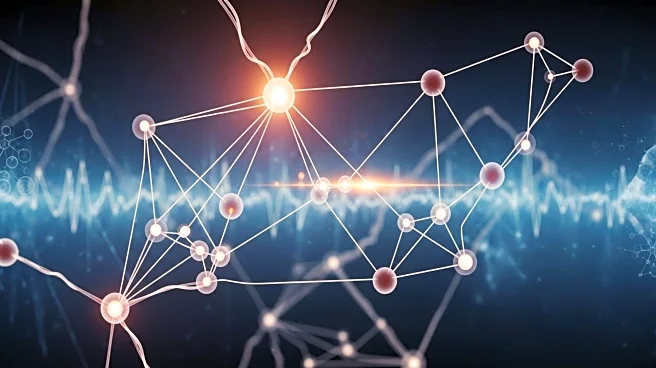What's Happening?
Researchers at Johns Hopkins University have developed a computational analysis pipeline using AI to identify disease-specific electrophysiological signatures in cerebral organoids derived from patients with schizophrenia and bipolar disorder. The study, published in APL Bioengineering, aims to reduce human error in diagnosing these mental health disorders, which currently rely heavily on subjective clinical evaluations. The team, led by Annie Kathuria, PhD, engineered organoids by converting blood and skin cells from patients into stem cells capable of producing various organ-like tissues. The AI system achieved a classification accuracy of 95.8% for schizophrenia and 83% for bipolar disorder, which improved to 92% with additional testing. The research involved only 12 patients but is expected to have significant clinical applications.
Why It's Important?
The use of AI in identifying neural signatures for schizophrenia and bipolar disorder represents a significant advancement in psychiatric diagnostics. These disorders are notoriously difficult to diagnose due to the lack of objective biomarkers, often resulting in trial-and-error treatment approaches. The ability to accurately classify these conditions using AI could lead to more precise and timely interventions, potentially reducing the duration and cost of treatment. This development could benefit patients who are resistant to common medications, such as Clozapine, by providing more tailored drug therapies. The research also opens avenues for further exploration into AI's role in enhancing psychiatric care and drug development.
What's Next?
The research team is collaborating with neurosurgeons, psychiatrists, and neuroscientists at Johns Hopkins School of Medicine to recruit more psychiatric patients for further testing. They aim to explore how different drug concentrations affect the organoids' neural signatures, potentially leading to more effective treatment protocols. This could revolutionize the current trial-and-error method of prescribing psychiatric medications, allowing for quicker and more accurate drug selection. The study's findings may also pave the way for broader applications of AI in diagnosing and treating other neurological disorders.
Beyond the Headlines
The integration of AI in psychiatric diagnostics raises ethical considerations regarding data privacy and the potential for AI to replace human judgment in clinical settings. It also highlights the need for interdisciplinary collaboration in developing AI-driven healthcare solutions. The study's approach of using organoids as testbeds for drug therapies could lead to more personalized medicine, shifting the paradigm from generalized treatment to individualized care based on specific neural signatures.









